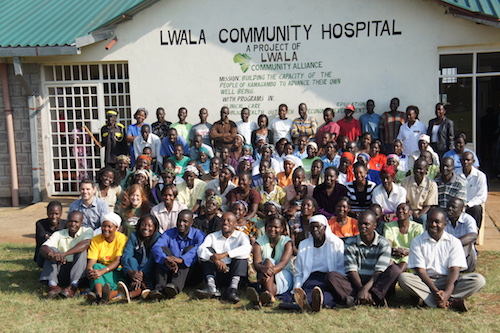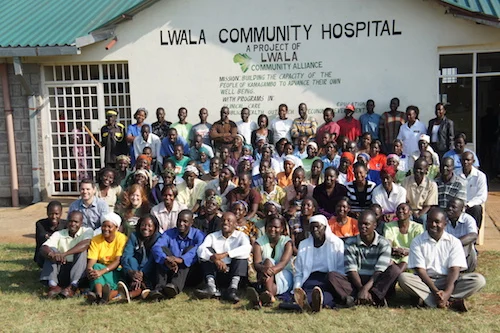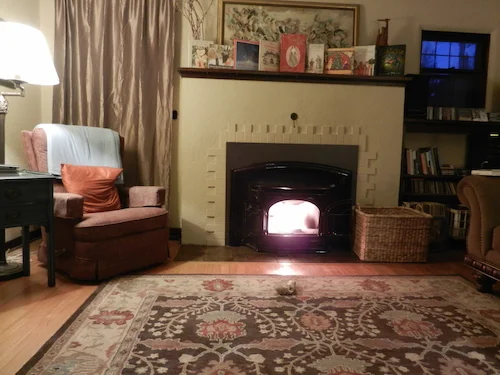The Ritual of Returning (to Kenya)

Photograph by the Lwala Community Alliance
Home. What a compelling, elusive word that is. What a strong hunger the human heart has for home, and what a hard thing it is to find and keep a home—not just a building, but a place to belong—a place to be from and a place to go to.
—Barbara Brown Taylor
Throughout my entire childhood, my family lived in Central Pennsylvania, just three miles outside of Harrisburg, the state capital. I had never flown on a plane until my freshman year of college, which is hard to believe a million miles later. This early plantedness had some benefits. For one, I knew where I belonged— home was obvious. I also knew my grandparents, aunts, uncles, and cousins well because weekends and holidays were always spent with family.
I remember that curious familiarity of arriving at my grandparents’house in Altoona, PA, for Christmas each year. The ritual of driving up the steep incline of their street, often snow covered, honking once as we drove by their place to alert everyone we had arrived, and turning the car around at the hilltop to park safely with our emergency brake on and wheels turned in toward the curb. As we entered the house, the scent of well-known hugs and the sound of greetings like, “Hi, doll”gave me deep comfort in returning. The scene inside was never surprising — the classic elves on the stairs, the plastic mistletoe in the archway, the real fire, and the family favorite apple pie. There was something grounding in the predictability of it all.
As I write this, I am in Lwala, Kenya, for perhaps the 25th time and, like traveling to my grandparents’home, there is a deep comfort in returning. Going to Kenya is no longer an adventure but a seasonal ritual. The familiar routines are coaching myself through the long hours on the plane, arriving at night in the clammy Nairobi airport, overnighting at a small guesthouse where I am remembered by name, and traveling the following day to Lwala, which is seven hours west of the capital. Driving down the dirt roads as we near the village brings up that same warm sensation as approaching the hilly streets of Altoona. My relationships in the village also have a worn-in feel. After work most evenings, I walk around the surrounding villages and am greeted by so many familiar faces.
This is not a second home, but a place of work. And as the leader of the Lwala Community Alliance, I am duty-bound to return quarterly to see the impact of our health and education project, which now serves 20,000 people in this area where 1 in 5 adults is HIV positive. In the last 6 years, I have been a part of a determined effort to increase child survival, reduce the burdens of HIV, and help girls and women succeed. And we are seeing real results. So I am not here to retreat and relax. I am compelled to return because of friends my wife Jena and I have here — friends who want to know how our baby is growing, friends who have shared in the labor of our mission together. But I primarily attend long meetings to review work plans and budgets, to encourage staff management to follow through on our goals, and to hear community concerns. With 180 Kenyan colleagues employed in various roles across our programs, we are out to prove together that locally based organizations rooted in the communities they serve are uniquely positioned to address poverty and poor health.
Through the faithfulness of returning and working, we have great fondness for our second life in Lwala — one that is parallel to our life in the U.S. Finding the intersection in these concurrent worlds is not always easy, but there is something deeply satisfying about having relationships and routines in two otherwise distinct places. As much as I miss the surety of my childhood idea of home, I am grateful for the tension that stretches me between two continents. I am drawn back not as an explorer or safari gazer who longs for Africa in the naïve and ideal sense, but because I love what Africa has become for us — a place where we belong, a kind of home. And I know that some day when this ritual of returning to Kenya becomes less regular, I will be homesick.
The trouble and gift with any routine is that it wears away the romanticism. If you show up at Grandma’s house often enough, you see that under the surface, not everyone gets along. There are grudges and divorces and sicknesses, and over time, people you know will disappoint you. Others have expectations of you. The same is true for me in Kenya. I have been here frequently and faithfully enough that I see the inglorious parts of village life — people hurt me sometimes and have many expectations of me. I get mad when trusted workers cheat me, sad when friends die, and frustrated when colleagues quit. I have gotten involved deeply enough that I feel implicated in the success of the community and, at times, that is an undue burden.
But Dietrich Bonheoffer reminds us that we know we have entered into genuine community only when it becomes difficult. We must move beyond the ideal of community and into the practical working out of community. If we can embrace a place and love it and determine to work out its difficulties, then we are in community. So somehow, sharing life in this one rural place called Lwala with my wife Jena, thousands of Kenyan acquaintances, and the staff of the Lwala Community Alliance through times of doubt and darkness alongside times of joy and redemption has brought us into true community. Through this working out, Lwala has become a home, a place to belong— one of the places we are from and a place to which we go.



















